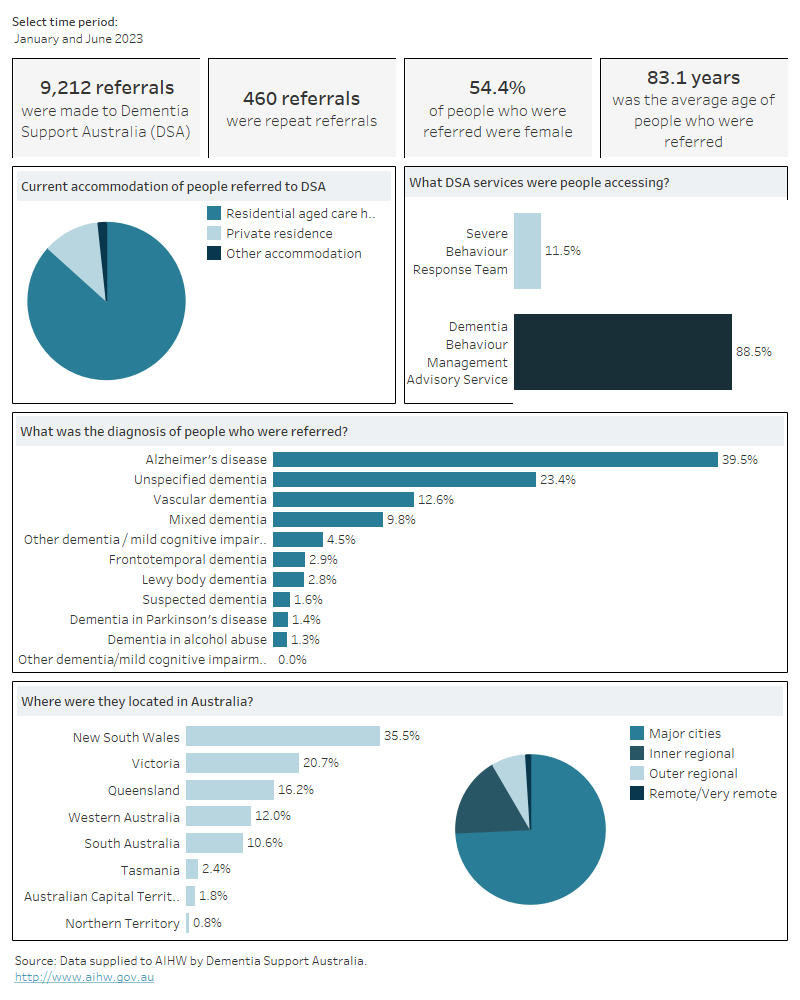Behaviour support programs
The Dementia Behaviour Management Advisory Service (DBMAS), Severe Behaviour Response Teams (SBRT) and the Specialist Dementia Care Program (SDCP) form part of a three-tiered approach to behaviour support for people experiencing behaviours and psychological symptoms of dementia (BPSD). Each tier provides support for symptoms of increasing severity: DBMAS for mild to moderate symptoms; SBRT for more severe BPSD; and the SDCP transitional residential care for those with very severe BPSD.
Dementia Behaviour Management Advisory Service (DBMAS) is delivered by Dementia Support Australia. It is a mobile workforce of health and allied health professionals who provide support for people living with dementia and their carers, whose wellbeing or care is impacted by the presence of mild to moderate behaviours and psychological symptoms of dementia. DBMAS supports people with dementia and their carers living in community, residential care, and acute care settings.
The Severe Behaviour Response Teams (SBRT) are also delivered by Dementia Support Australia and provide support for people living with dementia and their carers, whose wellbeing or care is impacted by the presence of severe behaviours and psychological symptoms of dementia. SBRT supports people with dementia and their carers residing in Commonwealth-funded residential aged care facilities, multi-purpose services, or flexibly funded services.
The Specialist Dementia Care Program (SDCP) provides a person-centred, multidisciplinary approach to care for people experiencing very severe BPSD, whose behaviours may put them or others at risk, or otherwise mean they are unable to be appropriately cared for by mainstream aged care services. The SDCP offers specialised, transitional residential support in a small dementia friendly unit, focusing on reducing or stabilising symptoms over time, with the aim of enabling people to move to less intensive care settings.
Between January to June 2018 and January to June 2023 there was a 161% increase in the total number of referrals that were supported by DSA (DBMAS, SBRT) – a 153% increase for the DBMAS and 235% increase for SBRTs. This increase is likely due to increased awareness of DSA, combined with a growing awareness of the importance of supporting people experiencing behaviours and psychological symptoms of dementia in Australia. Inadequate care for this group was highlighted in the Royal Commission into Aged Care, Quality and Safety.
Select a 6-month time period (between 1 January to 30 June 2018 and 1 January to 30 June 2023) in Figure 11.1 to explore the profile of referrals supported by DSA (DBMAS, SBRT) during this time.
Figure 11.1: Profile of referrals supported by Dementia Support Australia (DSA)
A panel of figures including bar graphs and pie charts showing demographic characteristics and service use information of referrals to Dementia Support Australia in 6 month periods between January to June 2018, and January to June 2023. The majority of referrals were for people living in residential aged care, and those living in Major cities from the most populous states (New South Wales, Victoria and Queensland). The majority of referrals were for accessing the Dementia Behaviour Management Advisory Service rather than Severe Behaviour Response Teams. The most common type of dementia recorded was Alzheimer’s disease, closely followed by Unspecified dementia.

Between January and June 2023, there were just over 9,200 referrals to DSA (DBMAS, SBRT). This had slightly decreased by 1.8% (from nearly 9,400 referrals) from the number of referrals in the previous 6 months (July to December 2022).
From January 2020 onwards, DSA were able to continue to deliver services when there were changes in public health policy as a result of the COVID-19 pandemic. This was achieved by adhering to social distancing and infection control requirements, as well as providing video conferencing services. DSA also released a resource for aged care services with tips for managing a person living with dementia whose behaviour may be impacting their care.


